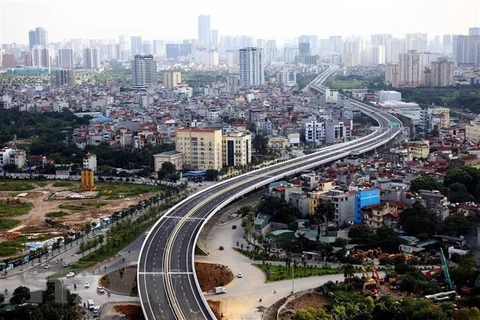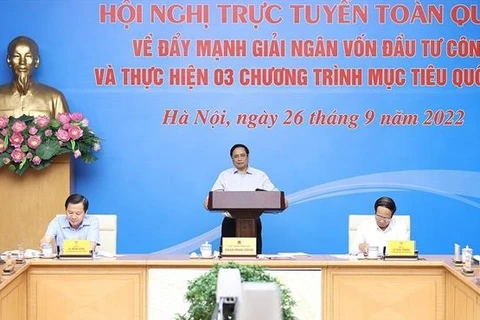 Along with renovating its growth model towards sustainability, Vietnam is constantly updating strategies, plans and programmes towards a green, low-carbon and circular economy with sustainable development. (Photo: VNA)
Along with renovating its growth model towards sustainability, Vietnam is constantly updating strategies, plans and programmes towards a green, low-carbon and circular economy with sustainable development. (Photo: VNA) Hanoi (VNA) - Along with renovating its growth model towards sustainability, Vietnam is constantly updating strategies, plans and programmes towards a green, low-carbon and circular economy with sustainable development.
Forming green market
Speaking at an October 10 workshop on measures to promote green procurement in public investment, Ho Cong Hoa, deputy head of the Central Institute for Economic Management (CIEM) 's Department for Social Affairs Research, said that green procurement played an important role in establishing a green market in Vietnam.
He pointed out that the total state budget expenditure in the 2015-2020 period accounted for about 25.9-30.2% of GDP, of which spending for development investment made up about 19.7-30.8% of the total state budget and the total public procurement package 12.5% of GDP on average.
"Vietnam has issued policies on green public procurement, gradually forming a green purchasing market. The requirements for environmental protection have been mentioned in the pre-qualification and bidding invitation documents for investors and contractors," said Hoa.
However, he also emphasised that the new regulations mainly require solutions to minimise the environmental impact caused by projects, especially during the construction phase. Some procurement documents require contractors to provide environmental information, but no specific criteria exist.
To implement green public procurement, Hoa suggested that there should be regulations that directly adjust green public procurement activities, such as mandatory integration of environmental criteria in the public procurement process to analyse and evaluate investment options and select the best contractor.
Hoa also emphasised the need to organise an investigation and assessment of green businesses and the market's ability to provide green goods and services, especially local firms. Moreover, the government should institutionalise green public procurement policies to create policy tools for sustainable consumption and production models. They must be open, transparent and fair.
Additionally, the government should issue policies that require, favour, encourage, and create a change from awareness to action for businesses on sustainable/green production and consumption, as well as more programmes and preferential policies. Furthermore, promoting domestic production, research and innovation, technological and product innovation towards green and sustainable living, and a circular economy is also necessary.
Ministries, agencies, and localities must integrate green growth targets, especially green standard public expenditure targets, into annual budget estimates and annual socioeconomic development plans, analysing and evaluating the overall cost-benefits in consideration of the efficiency of resource use, environmental costs, and inclusivity in investment projects, public products and services.
According to Hoa, ministries, sectors, and localities need to integrate green public procurement regulations into the Ministry of Planning and Investment (MPI) websites, including bidding and budget estimate regulations. On the other hand, these websites must be connected to those of the Ministry of Industry and Trade, the Ministry of Finance, and the Ministry of Natural Resources and Environment.
Dang Duc Anh, deputy director of the CIEM, said that innovating the growth model towards sustainable development, green growth, and the circular economy was an inevitable solution against the increasing impacts of climate change, environmental pollution, and the over-exploitation of natural resources.
The seminar heard that Vietnam has continuously updated its strategies, plans and programmes towards a green and low-carbon economy, circular economy, and sustainable development.
In the summer, the Prime Pinister issued Decision No. 888/QD-TTg on solutions to implement the commitment in COP26, the National Green Growth Strategy and Action Plan for 2021-2030, as well as Decision No. 687/QD-TTg approving the development of the circular economy in Vietnam.
The MPI is also preparing an outline to amend the 2013 Law on Bidding towards green public procurement, sustainable development, and green growth.
The CIEM, a unit under the Ministry of Planning and Investment, organised the workshop in collaboration with the German Agency for International Cooperation (GIZ)./.






















